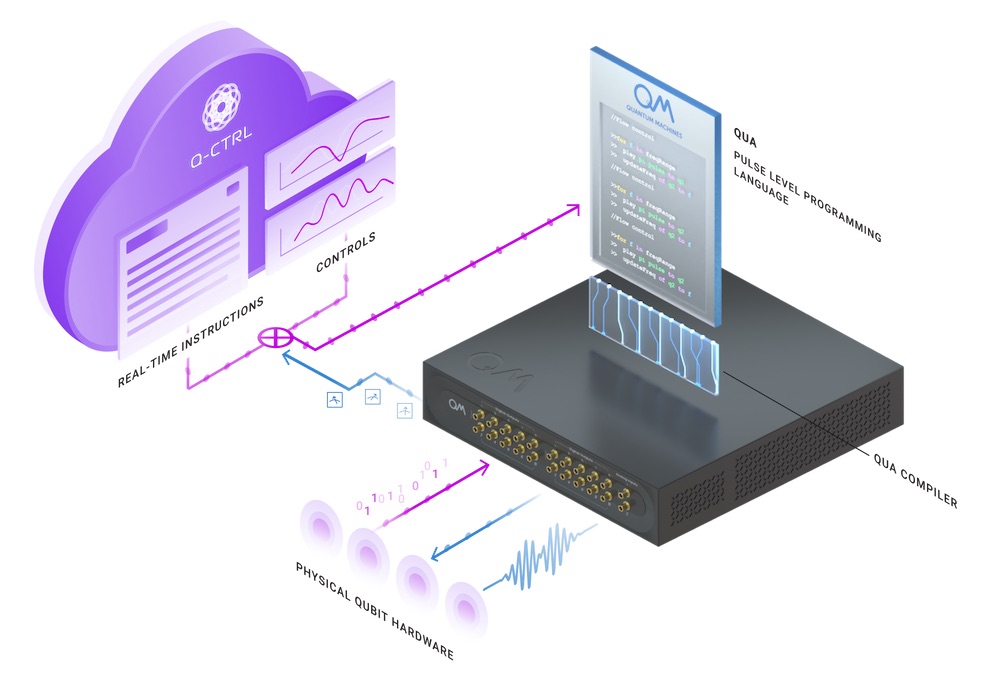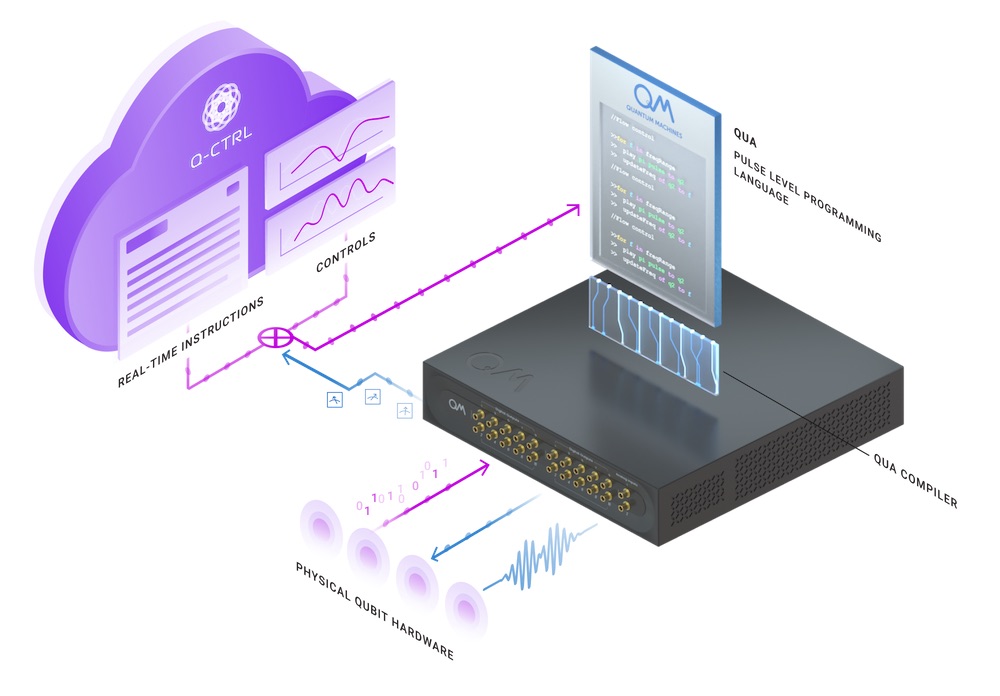
Q-CTRL, a startup that applies the principles of control engineering to accelerate the development of quantum technology, and Quantum Machines, creator of the first complete hardware and software solution for the control and operation of quantum computers, today announced a global commercial partnership to integrate Q-CTRL’s firmware into Quantum Machines’ quantum hardware platform.
Quantum computers process information in a totally new way and hold tremendous potential for applications ranging from drug discovery and industrial chemistry to finance and AI. But these systems are extremely fragile and bring with them extraordinary demands on the conventional electronic systems needed to make them run. Most conventional electronic systems designed for the telecommunications industry just can’t meet these demands.
Addressing this problem head on, Quantum Machines will integrate Q-CTRL’s “quantum firmware” into its Quantum Orchestration hardware and software platform (QOP) stack to provide an additional layer of control optimization and features that harnesses the best of what the QOP offers, for teams looking to enhance the performance of quantum computers. Both firms plan to jointly market their combined solution to quantum computing researchers in government, academia and private industry.
QM’s Quantum Orchestration platform (QOP) comprises the most advanced classical hardware and software for the control and operation of quantum processors. The QOP constitutes the cloud and data-center infrastructure capable of realizing the potential of all quantum computers. At the heart of the QOP is Quantum Machines’ Pulse Processor. This unique classical processor is capable of running even the most advanced quantum algorithms out of the box - from AI-based calibration routines to multi-qubit quantum error-correction.
Q-CTRL is dedicated to solving the Achilles heel of quantum computing – hardware error and instability caused by environmental ‘noise.’ They do this by delivering a set of tools and techniques that allow quantum computations to be executed with greater success; this quantum firmware constitutes the lowest layer of the quantum computing software stack. These techniques have been demonstrated to improve the performance of real quantum computing hardware by orders of magnitude.
Combining Q-CTRL’s quantum firmware and algorithms with Quantum Machines’ powerful hardware and intuitive QUA language, creates a solution that may drive the entire quantum computing field forward at a much faster pace. The collaboration will enable users to benefit from Q-CTRL’s noise reduction and algorithm optimization tools to improve the control over complex experiments and scalability by leveraging Quantum Machines’ unique and powerful real-time capabilities.
“Quantum Computing is probably the most challenging technological advancement we, as a society, are working on today,” said Dr. Itamar Sivan co-founder and CEO of Quantum Machines. “To achieve the promise of these machines, we still require major advancements in the current stack, as well as tight collaboration between global leaders in the field. Our collaboration with Q-CTRL, a world-leading company in control engineering, will enable researchers to realize the potential of their quantum hardware and help scale quantum computing development faster than ever before.”
“While qubit numbers have been a key measure of progress in the industry, R&D professionals know that error reduction is just as important in unlocking the true potential of quantum computers,” said Michael J. Biercuk, founder and CEO of Q-CTRL. “Our tools make it easy to design quantum logic - the building blocks of quantum algorithms - so they’re robust against error. By partnering with Quantum Machines, we’re able to directly deploy these capabilities with the Quantum Machines’ advanced processor needed to run such quantum logic.”
The quantum computing market is growing rapidly. Gartner predicts(1) that by 2023 20% of organizations will be budgeting for quantum computing projects, compared to less than 1% today. The total addressable market is the US$268Bn advanced computing market(2), providing enormous growth potential for quantum computing hardware capable of solving real problems with enhanced performance relative to current prototype systems.
Quantum computers process information in a totally new way and hold tremendous potential for applications ranging from drug discovery and industrial chemistry to finance and AI. But these systems are extremely fragile and bring with them extraordinary demands on the conventional electronic systems needed to make them run. Most conventional electronic systems designed for the telecommunications industry just can’t meet these demands.
Addressing this problem head on, Quantum Machines will integrate Q-CTRL’s “quantum firmware” into its Quantum Orchestration hardware and software platform (QOP) stack to provide an additional layer of control optimization and features that harnesses the best of what the QOP offers, for teams looking to enhance the performance of quantum computers. Both firms plan to jointly market their combined solution to quantum computing researchers in government, academia and private industry.
QM’s Quantum Orchestration platform (QOP) comprises the most advanced classical hardware and software for the control and operation of quantum processors. The QOP constitutes the cloud and data-center infrastructure capable of realizing the potential of all quantum computers. At the heart of the QOP is Quantum Machines’ Pulse Processor. This unique classical processor is capable of running even the most advanced quantum algorithms out of the box - from AI-based calibration routines to multi-qubit quantum error-correction.
Q-CTRL is dedicated to solving the Achilles heel of quantum computing – hardware error and instability caused by environmental ‘noise.’ They do this by delivering a set of tools and techniques that allow quantum computations to be executed with greater success; this quantum firmware constitutes the lowest layer of the quantum computing software stack. These techniques have been demonstrated to improve the performance of real quantum computing hardware by orders of magnitude.
Combining Q-CTRL’s quantum firmware and algorithms with Quantum Machines’ powerful hardware and intuitive QUA language, creates a solution that may drive the entire quantum computing field forward at a much faster pace. The collaboration will enable users to benefit from Q-CTRL’s noise reduction and algorithm optimization tools to improve the control over complex experiments and scalability by leveraging Quantum Machines’ unique and powerful real-time capabilities.
“Quantum Computing is probably the most challenging technological advancement we, as a society, are working on today,” said Dr. Itamar Sivan co-founder and CEO of Quantum Machines. “To achieve the promise of these machines, we still require major advancements in the current stack, as well as tight collaboration between global leaders in the field. Our collaboration with Q-CTRL, a world-leading company in control engineering, will enable researchers to realize the potential of their quantum hardware and help scale quantum computing development faster than ever before.”
“While qubit numbers have been a key measure of progress in the industry, R&D professionals know that error reduction is just as important in unlocking the true potential of quantum computers,” said Michael J. Biercuk, founder and CEO of Q-CTRL. “Our tools make it easy to design quantum logic - the building blocks of quantum algorithms - so they’re robust against error. By partnering with Quantum Machines, we’re able to directly deploy these capabilities with the Quantum Machines’ advanced processor needed to run such quantum logic.”
The quantum computing market is growing rapidly. Gartner predicts(1) that by 2023 20% of organizations will be budgeting for quantum computing projects, compared to less than 1% today. The total addressable market is the US$268Bn advanced computing market(2), providing enormous growth potential for quantum computing hardware capable of solving real problems with enhanced performance relative to current prototype systems.
Footnotes:
1) Gartner Research (2019). The CIO’s guide to quantum computing.
2) BCC Research LLC (2019). Analytics Markets: A Global Outlook; BCC Research LLC (2018). Global Markets and Technologies for Edge Computing Through 2023.




 IonQ Achieves Industry Leading Performance on Next Generation Barium Qubits
IonQ Achieves Industry Leading Performance on Next Generation Barium Qubits